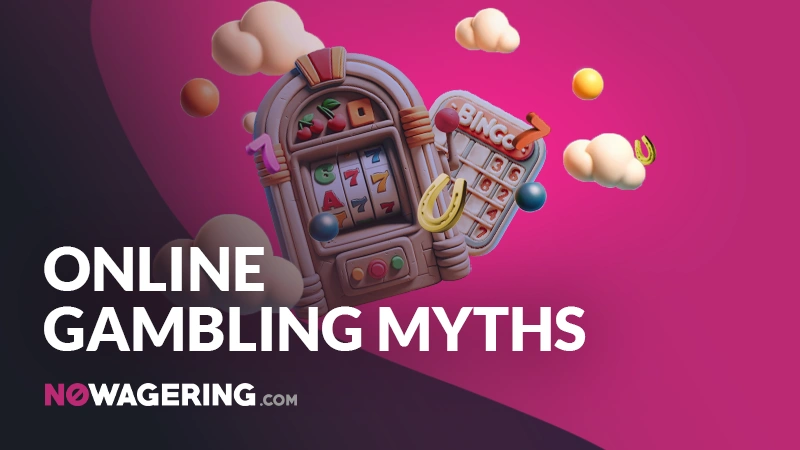10 common online gambling myths: A complete guide

Setting the record straight
We’ve now entered what some are calling the ‘The Age of Misinformation’. Falsehoods, alternative facts and fake news are rife.
The online gambling industry, however, is no stranger to nonsense. Some people have given it a bad rap since its conception in the 1990s, and it’s suffered more than a bit of slander.
There are some online gambling myths that need tackling. We want to dispel those myths, expose the mistruths, and clarify the facts so that players can enjoy gambling online without being misled. The reality is that you get a fair chance when you gamble online at a licensed casino.
So what are those common online gambling myths?
- Myth 1: Online gambling is rigged
- Myth 2: Online casinos don't play fair
- Myth 3: Online gamblers have a problem
- Myth 4: Casinos let you win from time to time to stop you walking away
- Myth 5: Online casinos manipulate outcomes
- Myth 6: Practice makes perfect
- Myth 7: Online casinos encourage underage gambling
- Myth 8: Online casinos don't have proper licences and regulations
- Myth 9: Past outcomes influence future ones
- Myth 10: Online gambling doesn’t offer a ‘real’ casino experience
Debunking the myths
Myth 1: Online gambling is rigged
You might hear some people claiming the online casino industry is rigged. Complainants are generally recent losers, feeling a bit bitter about it. Nothing could be further from the truth!
Regulators licence and monitor online casinos, ensuring they adhere to strict rules. Regulators scrutinise every site before issuing a licence, and even then, there are regular audits.
Additionally, independent third parties often carry out certifications. For example, eCOGRA , an internationally recognised organisation. issues certificates to tested casinos.
Reputable and independently certified casinos include:
- BetVictor (eCOGRA)
- William Hill (Technical Systems Testing)
- Hot Streak Casino (eCOGRA)
In reality, random number generators (RNGs) underpin online casino games, ensuring unbiased results. Essentially, an RNG guarantees a certain level of unpredictability.
Developers also test their own online slots to ensure that they know what the return to player (RTP) rate is. Some reputable developers include:
- Pragmatic Play
- NetEnt
- Playtech
It's easy for players to check the RTP of a particular game – which essentially lets them know what the house edge is.
The next time someone falsely claims that an online casino or game is rigged, you can put them right!
Myth 2: Online casinos don't play fair
Suggesting that casinos don’t play fair is incorrect. Casinos are businesses, so their main objective is profit, and they are generally run in a very responsible way.
The UK Gambling Commission (UKGC), arguably the strictest gambling regulator in the world, enforces very specific guidelines.
Furthermore, the UKGC sets out ‘technical standards’. These, along with the Data Protection Act of 2018, protect players’ funds and personal details. Some of the UKGC’s Remote Technical Standards requirements include the following:
- Secure management of data using encryption
- Cyber security measures to protect payment data, secure transactions and detect fraud
- Implementing measures to detect and prevent unfairness or cheating
- General data protection to ensure that players’ information is used responsibly
Clearly, the UKGC takes fairness very seriously. In short, if the site is UKGC-licensed, players can relax.
Myth 3: Online gamblers have a problem
Some people raise an eyebrow at the first mention of gambling, often because they hold stigmatic, inaccurate beliefs.
The truth is that gambling addiction is rare. The vast, vast majority of players gamble responsibly, and do so as a form of entertainment.
For those struggling, a network of resources is available to both online and in-person gamblers. Britain boasts one of the best support networks in the world. Helplines, charitable organisations, education and self-exclusion programs all offer
Myth 4: Casinos let you win from time to time to stop you walking away
This is a particularly crackpot myth. Some people suggest that online casinos keep you playing by letting you win when you look like you’re about to call it a day.
Casinos do not monitor individuals’ play in this way (the required manpower would be monumental for one thing). As we’ve mentioned, these games are underpinned by a random number generator. On top of that, there wouldn’t be any reliable way to tell when a player is about to quit.
It’s natural for the human brain to spot patterns where there are none. However, online slots are not designed to trick players in this way. It's simply another online gambling myth.
Myth 5: Online casinos manipulate outcomes
Some ill-informed folk think that online casinos manipulate outcomes based on various factors. A few of these factors include:
- The time of day
- The amount of time which has passed since a slot paid out
- The likelihood of the player logging off
- The amount the player has already spent
This is absolutely demonstrably untrue.
RNGs ensure that the likelihood of one spin paying out is exactly the same as the next. This is simply another case of gamblers looking for patterns where none exist.
Some people doubt the efficacy of RNGs, or think it could all be rigged. However, there are regular tests of fairness which assess the RTPs and variance of games. Independent organisations examine games closely, including at the underlying algorithms, to ensure fairness.
Experienced gamblers understand the concept of a random number generator. And they don’t allow false claims of manipulation to impact their play.
Myth 6: Practice makes perfect
It's said that practice makes perfect, and more online slots play experience makes you a better player.
While this may be a good mantra for many aspects of life, you can disregard it completely when it comes to gambling. In reality, these are games of chance, and practice has nothing to do with it.
With experience, players may become more familiar with the mechanics of a slot game, and, for example, learn how to earn more free spins. This isn’t the same as being ‘better’ at playing.
Myth 7: Online casinos encourage underage gambling
Contrary to beliefs held by some conspiracy theorists, online casinos are not trying to lure kids onto their platforms. It's a common online gambling myth. Accusations like these are unfounded, and often come from organisations with an agenda.
Regulators, casinos and charities all pay very close attention to underage gambling, and are always looking to improve. Protecting young people is one of their primary concerns.
Measures they take to protect young people include:
- Age verification processes
- Required photo ID documents
- KYC (know your customer) requirements
- Specific stake limits for younger gamblers
- Advertising restrictions
One of the central goals of the Gambling Reform White Paper is to protect younger players,. Casinos, therefore, collaborate closely with regulators to help keep youngsters safe. Together, they implement a number of effective barriers to prevent underage gamblers playing at an online casino.
Myth 8: Online casinos don't have proper licences and regulations
False! Online casinos, particularly in Britain, are heavily regulated. The UKGC has many responsibilities. Among them are:
- Issuing licences to operators it deems suitable
- Auditing licensees to assess compliance and fairness
- Bringing down sites attempting to operate without a licence
- Issuing heavy fines and penalties to those which don’t follow the rules
The UKGC protects players. It looks to ensure that all online casinos, and in-person casinos for that matter, hold one of its licences.
That’s not to say that illegal casinos don’t exist. But all you need to do is, when joining a new casino, check that it holds a UKGC licence.
Virtually every country has its own answer to the UKGC. Some other respectable regulators whose licences carry weight include:
- Danish Gambling Authority
- Gibraltar Gambling Commissioner
- Malta Gaming Authority
- Curaçao Gaming Authority
Myth 9: Past outcomes influence future ones
Many gamblers wrongly hold the belief that the outcome of a game of chance can be predicted based on the outcomes of previous games. This is a well-established phenomenon known as ‘gambler’s fallacy’. It's a complete myth.
For example, if a coin is tossed five times and lands on heads each time, some think the sixth toss is more likely to be tails. It won't be.
Events (tosses) are independent of one another. The odds don’t change, and it’s still 50:50. Things like this average out roughly evenly over time.
In some games, such as roulette, past results are made visible to players. Don’t convince yourself that a particular game is ‘overdue’ to pay-out. In fact, a win is just as likely immediately following another win as at any other time.
If you do have a 'winning streak' it will have been a case of luck. Online slot games results are random.
Myth 10: Online gambling doesn’t offer a ‘real’ casino experience
Online gambling is no less ‘real’ than putting coins into a slot machine. It’s more advanced and more progressive, and the thrill of the wager is just the same.
Live streamed games are hugely popular. These involve a real dealer dealing real cards at a real table, and the main difference being you can access it from anywhere!
It’s expected that playing at a live casino table via virtual reality hardware will soon become the norm.
Many casino sites put a lot of work into providing authenticity. This often involves adding website features such as chat rooms to introduce a social element to online casino games.
In fact, in many respects, the online casino experience is better! Traditional brick-and-mortar casinos simply can’t offer the same range and variety of games. Also, the quality of online slots is often higher, especially in terms of interactivity and graphics.
Lower overheads mean an online casino can afford to offer more attractive bonuses and game features.
Conclusion
'Casino games are rigged.'
They aren't – there’s a lot of misinformation about online gambling, and online gambling myths abound. So it’s important to take an objective stance. Always try to assess whether what you’re told is based on facts and stats, or fear mongering, and yet another online gambling myth.
Online casinos aren’t out to ‘get’ you. There are no rigged games. They’re businesses that provide a form of entertainment which is popular with millions of Brits. As with most forms of entertainment, it costs something, and that’s where the house edge comes in.
Online slots are forthcoming and transparent in the vast majority of cases. Just make sure you’re playing at a site which is licensed by the UKGC, and you can’t go far wrong.
Take a look at our top-rated casinos:

